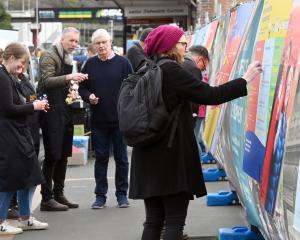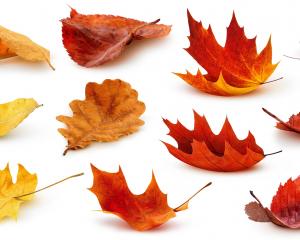Some of the children are held in rapt attention by the story being told by Su Ikin.
Others are restless, and fidget or crawl about, despite librarian Ikin's best efforts to engage all with action songs and counting rhymes.
It is Wednesday morning at the Dunedin Public Library in Moray Pl, and a good number of preschoolers and caregivers have gathered in the children's section's storypit to be entertained - without recourse to computer graphics.
It is a relaxed environment.
There are no gold stars withheld from those failing to demonstrate sufficient active interest.
Yet, there's potentially plenty at stake here.
The library's storytime encourages pleasure in books and reading and also helps child development, according to Phillipa Crack, youth services librarian at the Dunedin Public Libraries.
If you do not foster children's love of reading when they are young, they are unlikely to pick it up later, and being a competent reader able to comprehend the written word is an essential life skill, she says.
"Reading develops people's imaginations and exposes you to situations you probably never met yourself and makes you think how you would deal with it. It's a wonderful escape and entertainment and it's also educational. It develops concentration, and that's no small thing as it affects all your learning. I think it would be hard to get away from the importance of it, which is why we like getting children when they are very little."
This is less a warning to all those who are yet to get their child a library card, and more a confident assertion of the enduring value of books and their repositories.
The children's section of the city library is a colourful and inviting space, and probably a long way from the small juvenile department that opened on March 12, 1910, a couple of years after a free municipal library was established in Dunedin with funds from American philanthropist Andrew Carnegie.
It was stocked with titles such as Our Little Dots, Boy's Own Paper, Tom Brown's Schooldays and books donated by various Dunedin benefactors.
The library still stocks the classics - Treasure Island and Alice in Wonderland - but since the library started, children's literature has burgeoned, and vast numbers of colourful books stock the shelves, or overflow into basement stacks.
Some of the hottest picks at present are the Rainbow Magic series by Daisy Meadows, about fairies, which are very popular with little girls, the quirky Geronimo Stilton books, about a mouse journalist, the series about 12-year-old secret agent Zac Power, by H. I. Larry, and Louis Sachar's Holes, according to Mrs Crack.
Another favourite, Dav Pilkey's Captain Underpants series, has been instrumental in getting a lot of little boys to launch themselves as independent readers.
"They have lots of drawings and are funny in a toilet-humour sort of way, and they love it because it's a bit naughty and irreverent - so many little boys cut their teeth on those, the first few books they read on their own."
Some old favourites such as Roald Dahl's books, E. B. White's Charlotte's Web, Laura Ingalls Wilder's Little House on the Prairie series, The Very Hungry Caterpillar, and Where the Wild Things are are so popular they are rarely on the shelves, which is a good thing as there would not be space if all the copies were all in, Mrs Crack says.
In the past, reading did not have to compete with as many other pastimes and entertainments as it does today, but Mrs Crack and her team of children's librarians are heartened that children are still reading, many of them avidly.
A popular summer reading programme challenges children in the 8-12 age group to read several books over the summer holidays, keep a reading log and perhaps win a prize.
"It's wonderful when you have a child you've helped with a lot of suggestions for reading and they've read all those and come back for more," she said.
"Children make wonderful customers.
They are so open and they are very frank.
The wee children that occasionally throw a tantrum in front of the desk because they don't want to go home - you feel sorry for the parent, but we think `Isn't that lovely'.
Or the ones that run ahead because they are excited to be here."
Beyond families and individual children, the library supports schools with its learning support policy, put in place a few years ago after the national library service closed its doors in Dunedin.
Now early childhood centres and primary schoolteachers can have a class card which entitles them to borrow up to 30 items.
"We've found teachers have taken that up with alacrity because the school library, however good it is, can't meet every need on every subject.
Some of them use it for recreational reading, but mostly to enhance whatever subject they are studying at the time."
Just as adults find the library a warm and comfortable place to spend time during the day, some children wait there after school until their parents pick them up after work.
Most of the regulars tend not to read a lot - they do homework or socialise or use the computers, Mrs Crack says.
"For most of them it's just a place to go. I always feel sad about that because they may always associate libraries with places where you wait and are bored."
A somewhat controversial innovation is the teen space on the second floor, which opened in 2008.
Here teenagers gather after school to chat, use the computer terminals and browse the young adult collections of books, magazines and other materials.
It was part of an initiative to cater for groups that were not particularly well catered for elsewhere in the community, according to Bernie Hawke, library services manager for the Dunedin public libraries.
"As soon as we opened it, instant success - in fact it was too successful. Initially we had some issues to do with inappropriate language and behaviour that needed to be resolved, but now it's settled down to the use we had always envisaged."
While younger children are often avid borrowers of library books, there's a trend for teenagers move away from books as their interests change, but they are still required to read a range of material for NCEA.
The library provides help with lists identifying the types of reading required on the teen section of its website.
ALTHOUGH reference librarians do not get asked the quantities of questions they used to, as people turn to the internet, children's librarians still field a lot of homework inquiries.
Helping children find just the right piece of information is another satisfaction, especially as they often have to help children formulate the question in their minds first, according to Mrs Crack.
Besides face-to-face reference inquiries, the library supplies operators for the national children's reference service, anyquestions.co.nz.
Teachers and children can email an inquiry to an online librarian, who may first have to figure out what they really want to find out, then help them find reliable information on the internet.
It's an aid librarians would not have dreamed of in the past, she says.
"It's a great service and they don't just get the answer, although some of them ask expecting to, but they are guided through to how to find the answer.
As they get on in high school they do quite sophisticated research, primary resources, newspapers and so on, which prepares them for tertiary education, but they need to learn the skills to do that."
Many people searching the internet do not go past Google, but there are many other search engines to use, more effective ways to refine a search and find reliable information that research librarians can help with.
The Dunedin libraries are collaborating with other New Zealand libraries in a resource-sharing Epic (electronic purchasing in collaboration) system, which gives patrons access to thousands of electronic publications.
It subscribes to an extensive selection of electronic databases to do with current affairs, history, health resources, business, dictionaries, literature, science, and many other topics that are not available freely, but which can be accessed both in the library building and remotely by members through the library website.
It is part of the constant updating libraries have to do to keep abreast of technology.
The most recent major introduction is the Aotearoa People's Network Kaharoa, a free broadband internet service now in all the city's libraries.
It provides both computers and a wireless service for those with their own laptops, bringing people into libraries who may not have come before.
Another new technology that has been simmering in the background for some time is e-books.
According to Mr Hawke, the library may offer a loan service of e-media, both written or audio.
"One of the services we are looking at but certainly can't afford at the moment, is where customers can download a full spoken-word recording on to their iPod.
They will be specially encrypted so you can check out an audio book for a month, and after a month it just stops working on your device and it becomes available for another patron to download.
It has lots of potential because it reduces the wear and tear on the album, it simplifies access - if you are in London you could still download it from our machine if you had the right plugs on your laptop," he said.
Mrs Crack can see many applications where an e-book would be useful, but can't imagine it working with children's picture books where the illustrations are crucial.
"It's all brave new world and very interesting, and challenging, but what I think is heartening is children aren't as captivated necessarily by what computers will do as we are - I'm not taking about technology in the sense of games and all that - because it's second nature to them, there's nothing special about them.
"It's just another tool. I have great faith it's not going to overtake their lives."












